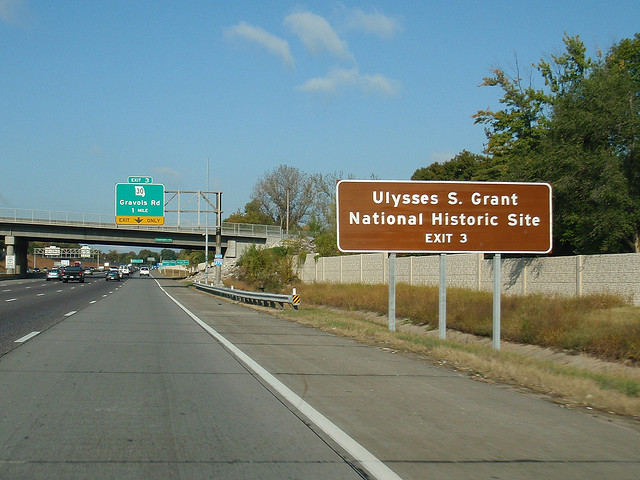If you’ve spent any time cruising down America’s highways, you’ve likely passed countless signs directing you to points of cultural and historical interest. You may not have given these signs much thought. (Though if you’re my father, you made a point of stopping at every single one on every single road trip throughout my youth.) However, a recently proposed rule change created a vocal, if somewhat unlikely, uproar.

In Missouri, you may see fewer signs like these. From Wampa-One.
The story has changed several times over the last week, with the latest update coming moments prior to writing this article. Here’s how everything went down:
First, in mid-December, the Missouri Department of Transportation (MoDOT) submitted a rule that would affect signs pointing to any tourist attraction that draws fewer than one million visitors per year. Ostensibly, the move was designed to save money. But it wouldn’t simply prohibit new signs from being posted; it would also mean removing existing signs. (No word on how removing existing signs saves money; presumably the maintenance costs outweigh the cost of manpower associated with removing them.)
In case you’re wondering, one million annual visitors is a lot, and a slew of attractions won’t fit the bill. According to the people who own and operate some of those attractions, the proposed rule is both devastating and counterintuitive. By removing one of the primary elements that drives people to the under-utilized attractions, they’ll attract even fewer attendees and may be forced to shut down. Of course, if Missouri is looking to clean up some perceived “clutter,” that might actually be the point.
Many of the affected attractions are historic in nature, and that has touched a nerve. The rule has significant economic implications as well. Bill Hart with Missouri Preservation told CBS St. Louis that, “In the smaller communities, these historic and cultural heritage tourism dollars can go a long way in bolstering the economy.”
Shortly after the new rule was proposed, Hart launched a petition to keep the signs in place.
Next, State Senator Gary Romine called for his constituents to make their concerns heard. “The tourism industry is a critical part of our state’s economy, especially for rural areas, which depend on incoming visitors to support local businesses,” Romine stated in a news release. “The proposed change would severely hamper the ability of our local communities to draw tourists to the area, costing us badly needed tourism dollars.”
Finally, on the 13th — just two days before the end of the “period of review” for the rule — it was reported that MoDOT will rewrite the proposed rule change in response to vocal opposition. MoDOT reportedly assured concerned citizens that the rule was never going to impact sites owned and operated by state and federal agencies. It’s unclear what exactly will change about the proposed rule, but a sign and marketing engineer from MoDOT told the St. Genevieve Herald that “small tourism shouldn’t really be affected.”
Stay tuned; we have a feeling we haven’t heard the last of this.